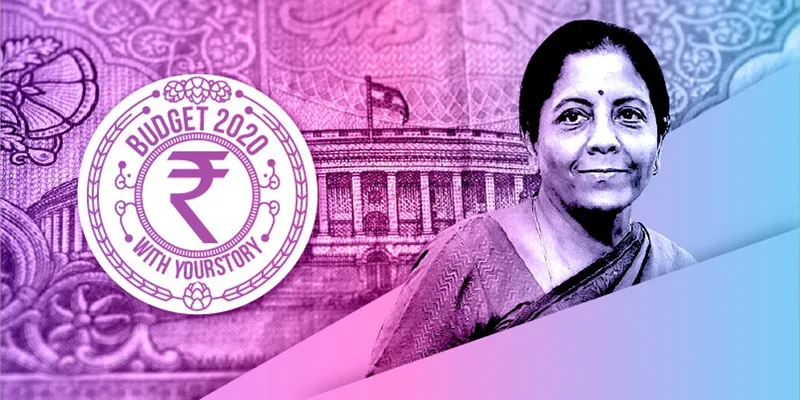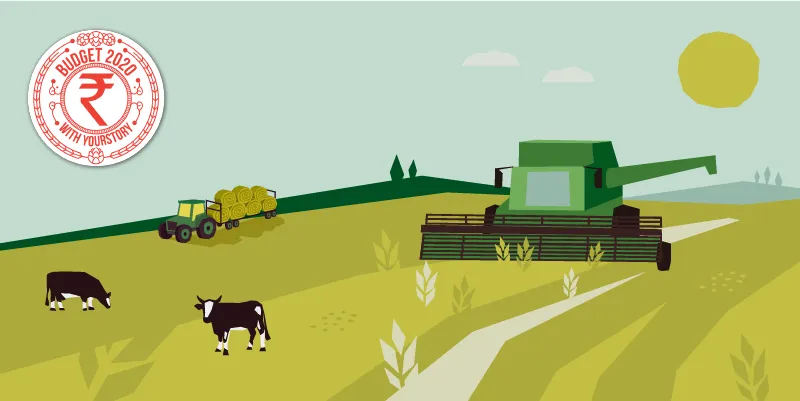Budget 2020: Nirmala Sitharaman proposes 16-point action plan to boost farmers' income
The finance minister has allocated Rs 2.83 lakh crore for irrigation, rural development, as well as agriculture and allied activities in the 2020-21 Union Budget
Boosting agriculture and allied activities has always been a key focus area in the Union Budget year after year. This year's Budget presented by finance minister Nirmala Sitharaman also follows suit. She announced that the government will be committed to doubling farmer income by 2022.
“A total of 6.11 crore farmers have been insured under the Pradhan Mantri Fasal Bima Yojana. However, farm markets need to be liberalised and made more competitive. We are looking at hand-holding of farm-based activities in cooperation with states,” she said.

Sitharaman proposed a 16-point action plan to achieve this.
Prioritising farmer welfare
The finance minister encouraged the state governments to follow the model laws of the central government on agricultural land leasing, marketing, and contract farming. According to the Observer Research Foundation, the per capita water availability in India fell by 15 percent starting the first decade of this century. Agriculture is an occupation that has been deeply affected because of this.
Sitharaman addressed this in the budget and said:
“Water stress related issues are a serious concern across the country. The government proposes comprehensive measures to relieve 100 water-stressed districts.”

The budget also has a provision to help farmers make a living out of barren lands. The government is set to help 20 lakh farmers set up standalone solar pumps. The scheme also includes providing solar power generation units to those owning shallow or arid lands. The electricity generated from these can in turn be sent to grids to gain income.
Indiscriminate use of fertilisers is one of the main reasons for ill soil health of agricultural lands. With regard to this, the finance minister announced,
“The government will ensure balanced use of all kinds of fertilisers to change the present incentive regime, which encourages excessive use of chemical fertilisers.”
Sitharaman also said that Food Corporation of India (FCI) as well as the Warehousing Corporation of India will be supported to build warehousing facilities on their land. In addition to this, NABARD will be entrusted with mapping and geo-tagging agri-warehouses across the country. This comes at a time when the agricultural sector is experiencing huge losses due to high cost of cold storage, improper management, unequal distribution and non-accessibility of warehousing facilities to farmers.
“I am proposing a village storage scheme that can be run by women self-help groups (SHGs). Besides this, enabling the Indian Railways to establish a Kisan Rail through PPP arrangement is on the plan. Refrigerated coaches in express and freight trains will ensure ease of transportation of perishable goods,” she says.
The Budget also included the announcement of the Civil Aviation Ministry’s 'Krishi Udaan' scheme, targeted to help farmers export their produce internationally.
An eye on allied activities
As astonishing as it might sound, the produce of the horticulture sector in India exceeds that of food grains. With the view to give a further boost to flowering plantations, Sitharaman said the states will adopt a cluster basis to focus on ‘one product per district’.
Sitharaman also proposed the expansion of integrated farming systems in rainfed areas.

“Multi-tier cropping, bee-keeping, solar pumps, solar energy production in non-cropping season, and zero-budget natural farming shall be given priority. The portal “jaivikkheti”, which focuses on online national organic products market, will also be strengthened. Financing on Negotiable Warehousing Receipts (e-NWR) has crossed more than Rs 6,000 crore. This will be integrated with e-NAM.”
The Finance Minister has set the agriculture credit target for the year 2020-21 at Rs 15 lakh crore. All eligible beneficiaries of PM-KISAN will be covered under the KCC scheme.
Since losses to the farming community has been mounting due to livestock diseases, the Budget included a goal to eliminate foot and mouth disease, as well as brucellosis in cattle, peste des petits ruminants (PPR) in sheep and goats by 2025. The coverage of artificial insemination was also increased from 30 to 70 percent.
“MNREGS would be dovetailed to develop fodder farms. Further, we shall facilitate doubling of milk processing capacity from 53.5 million MT to 108 million MT by 2025. Additionally, the government proposes to put in place a framework for development, management and conservation of marine fishery resources,” Sitharaman added.
Lastly, the Finance Minister spoke about the goal of raising fish production to 200 lakh tonnes by 2022-23 and involving youth in the fishery space through 3,477 Sagar Mitras and 500 Fish Farmer Producer Organisations. This is expected to raise fishery exports to Rs 1 lakh crore by 2024-25.
(Edited by Megha Reddy)








